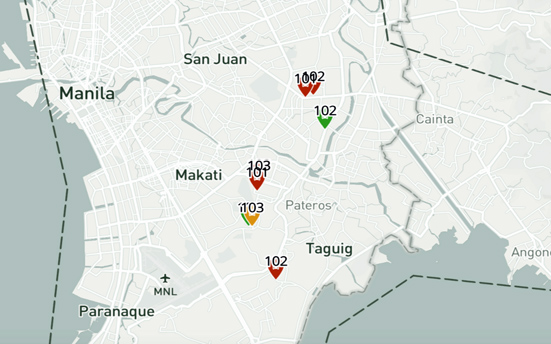Swat and Toyota tame Manila transport chaos
- July 21, 2020
- Steve Rogerson

Singapore-based smart mobility technology firm Swat Mobility and Toyota Motor have launched a corporate smart transportation system in the Philippines for KMC, a co-working and staff leasing service provider.
The system lets KMC employees and clients book rides through the SwatBiz app, plan routes in minutes, navigate drivers to close-to-home pick-up points and track vehicles in real time. The system automates many manual tasks, taming the chaos of manually planning and tracking vehicles so employees can get to work safely and efficiently.
Faced with problems from the on-going pandemic, KMC recognised that its operations would need to adapt. The company created the Home-Hub-HQ workspace to address the growing work set-up challenges during the crisis. KMC implements safe distancing and sanitisation measures at its facilities, but realised that employees would still struggle to get to its locations with limited public transportation.
“We implemented shuttle services for our employees and clients, but found that our administrative staff were spending nights and weekends taking bookings, planning, chasing vehicles and manually reporting,” said Alex Gomez, vice president at KMC.
Swat’s technology can tame Metro Manila’s notorious transportation chaos by taking bookings through its passenger app, instantly calculating close-to-door routes according to daily demand, navigating drivers to passengers via the driver app, and tracking all system activity through its administrative interfaces. It can automate 90% of the previous manual work in managing a corporate shuttle fleet while increasing fleet efficiency by 20 to 30%.
With the system, employees track their bus to their pick up point and no longer need to queue and wonder when they are going to get home. Additionally, employees will not have to worry about braving the infamously long queues at Metro Manila’s rail stations or packing themselves in overflowing jeepneys.
The system can address problems created by the Covid-19 pandemic in the Philippines. Only authorised employees may book rides and board vehicles, vehicle capacity controls set by the Department of Transportation (DoT) are enforced through the applications, and records are kept in real time to enable contact tracing and real-time reporting.
Swat launched its first services in the Philippines in May with the Toyota Mobility Foundation as part of the DoT’s Free Ride for Health Workers programme. This provided thousands of close-to-door rides for critical medical workers. Swat continues to work with Toyota Motor in the Philippines to roll out its technology to KMC and other local clients.
“I’m excited to work with an innovator like KMC as our launch client for Swat Mobility in the Philippines, in collaboration with Toyota,” said Nicholas Stipp, chief revenue officer at Swat.
While KMC is the first corporate client, Swat expects to launch many projects in the Philippines over the coming weeks, both for private and public transport. It is working closely with local partners to scale up operations to serve high demand.
“Deploying in the Philippines is especially meaningful because we can directly impact people’s lives by significantly reducing their commute time,” said Jarrold Ong, CEO at Swat Mobility. “Intelligent transportation like ours helps fill the gaps in urban transport systems; when applied on a larger scale, we can improve congestion levels and quality of life for people in the Philippines.”
Swat is a Singapore-based smart mobility firm that provides demand-responsive and ride-sharing technology in high capacity vehicles. Founded in 2016, Swat has completed over a million dynamically routed rides worldwide for commuters. The firm’s products are used by clients across Asia Pacific, including Sumitomo, Toyota, Transportation for New South Wales and Sembcorp Marine. Since its inception, the firm has garnered more than US$12m in funding from investors.
The company is headquartered in Singapore, with operations across Australia, Indonesia, Japan, Philippines, Thailand and Vietnam.





